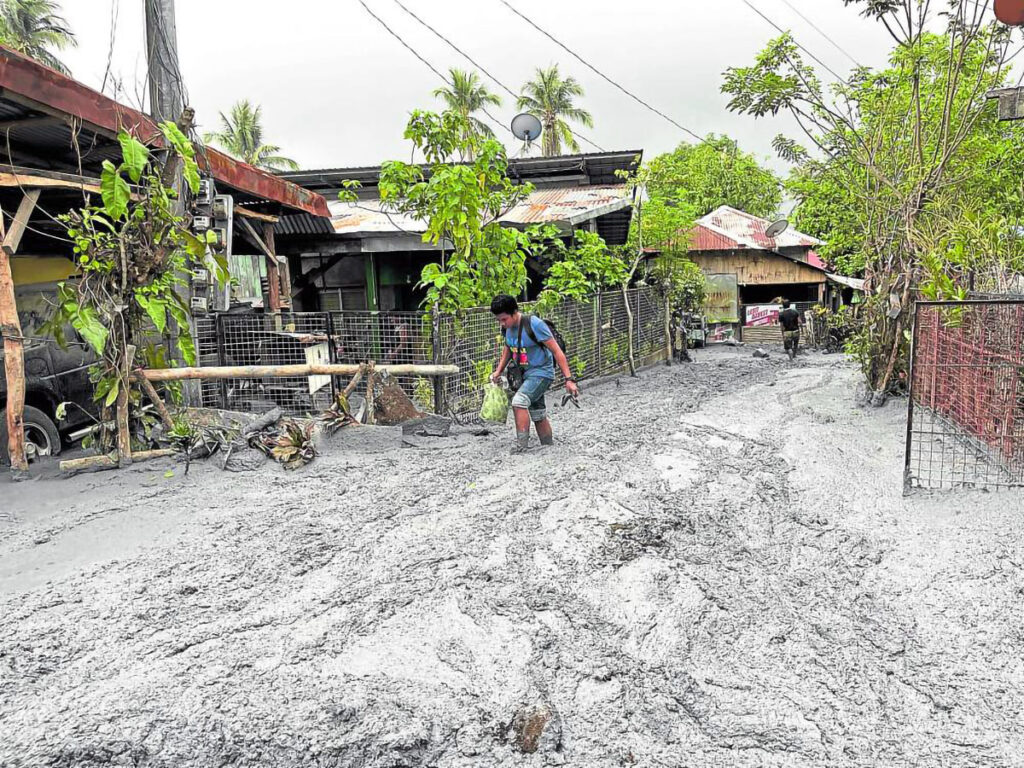
HAZARD Residents of Barangay Biak na Bato in La Castellana, Negros Occidental, have to wade in almost knee-deep lahar as they go about their daily activities on Thursday, three days after the eruption of Mt. Kanlaon on Monday night. CONTRIBUTED PHOTO
BACOLOD CITY, Negros Occidental, Philippines — Water sources were contaminated and crops worth millions of pesos were damaged on Negros Island by the eruption of Mt. Kanlaon and the lahar flow induced by rains after the blast on Monday night, local officials said.
The eruption affected farms in the cities of Bago and La Carlota and the towns of La Castellana, Moises Padilla and Pontevedra in Negros Occidental with damage to crops in the province reaching to P9.99 million.
Estimated losses reported by farmers growing high-value commercial crops were at P8.5 million while rice farmers lost P1.36 million and corn farmers, P122,250, said Negros Occidental Gov. Eugenio Jose Lacson.
READ MORE:
Kanlaon Volcano Eruption: LIVE UPDATES
Phivolcs: We warned public about Kanlaon eruption
Kanlaon Volcano update: Alert Level 2 stays
Also affected were farmlands in Canlaon City, Negros Oriental, considered the “vegetable basket of the Visayas.”
Kanlaon Volcano blast effects
Canlaon City Mayor Jose Cardenas said that while he had yet to receive figures on the extent of damage, the ash spewed by Mt. Kanlaon affected 1,630 vegetable farmers in his city.
He said lahar in Canlaon flowed through deep rivers, preventing this from overflowing onto roads and reaching residential areas and farmlands.
But Cardenas said water sources in the villages of Masulog and Pula had been contaminated.
Lacson said rivers and streams in La Castellana town and La Carlota City were choked with lahar.“The lack of drinking water is a major area of concern,” he said.
Mobile potable water stations are being set up to address the needs of residents.
Evacuation
The thick mudflow following Monday’s eruption also caused about 500 residents of Barangay Biak na Bato in La Castellana to evacuate.
Joselito Martinez, village chief of Biak na Bato, said they were clearing the highway of lahar, a grayish mudflow composed of ash and other debris from the eruption that was washed out by rains.
Martinez instructed residents not to drink water from their usual sources, saying these had been likely contaminated.
“The volcano appears to have calmed down and there is less lahar flow today (Thursday),” he said.
READ MORE:
Lahar hits Negros Occidental town after Kanlaon blast
Kanlaon quiet after night of rumbling, rain of rocks
La Castellana Mayor Rhummyla Nicor Mangilimutan, however, echoed the advice of the Philippine Institute of Volcanology and Seismology (Phivolcs) to be vigilant and to stay alert as they could not predict how Mt. Kanlaon would behave.
The mayor urged residents in critical areas in Biak na Bato to stay in evacuation centers. La Castellana currently has three centers with 1,173 evacuees.
Mangilimutan said between 10,000 and 12,000 residents in her town, most of whom are farmers in upland villages, were affected by the eruption of Mt. Kanlaon.
She said they needed water, food, and medicines because some of their residents suffered from cough, asthma, and eye irritation due to volcanic ash.
Lacson said Phivolcs representatives reported that there were fewer volcanic earthquakes and emissions at Mt. Kanlaon but “there is still a possibility for an eruption.”
Phivolcs recommended increased vigilance and readiness of communities along rivers draining southern Kanlaon as the weather bureau forecast thunderstorms that could generate larger volumes of lahar.
Meanwhile, around 1,500 passengers were stranded at seaports in Western Visayas following the eruption of Mt. Kanlaon, the National Disaster Risk Reduction and Management Council (NDRRMC) said on Thursday.
The NDRRMC said the volcanic activity resulted in the cancellation of 20 domestic flights and one international flight in Western and Central Visayas, but 12 of the domestic flights had already resumed on Thursday.